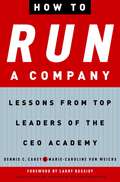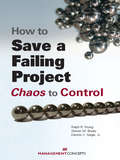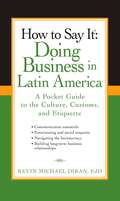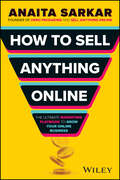- Table View
- List View
How to Run Your Business by The Book: A Biblical Blueprint to Bless Your Business
by Dave AndersonHow to use Bible-based leadership principles to improve business performance In How to Run Your Business by THE BOOK, famed leadership guru Dave Anderson reveals biblical lessons to help transform the people, culture, and results of your business. Not only will you master timeless business principles based on the world's bestselling book, you'll build a foundation for your business that leads to long-term success. This is a refreshing return to commonsense business basics, based on leadership lessons peppered throughout the Good Book. In these turbulent times, quality leadership is the key to surviving and thriving in the business world. You'll learn what the Bible has to say about hiring and training people, managing money, creating a leadership vision, balancing work and life, and achieving your most ambitious business goals. Includes practical, proven business guidance gleaned from the Bible Features smart business guidance like the Ten Commandments for elevating your people skills Shows you four vital steps for creating a tough-love culture of accountability Dave Anderson is also the author of Up Your Business!, If You Don't Make Waves, You'll Drown and How to Deal with Difficult Customers Best of all, you don't need to be familiar with the Bible to profit from these wise and timeless principles. All you need is a heart open to biblical wisdom and a willingness to lead with courage.
How to Run a Company
by Dennis C. Carey Marie-Caroline von WeichsLESSONS FOR EVERYONE IN BUSINESS FROM AN ALL-STAR TEAM Every six months Dennis C. Carey and Marie-Caroline von Weichs run the CEO Academy, an immersion course for newly appointed CEOs of the world’s leading companies—what Business Week called a “boot camp” for the next class of top executives. Those attending get a priceless range of unvarnished advice and invaluable lessons from an all-star team of veteran CEOs about how to get the results they were hired to achieve. What participants pay $10,000 to hear is now contained in this book, the insights and secrets of some of the most influential business leaders of our time. Here is advice from high-caliber businesspeople such as Larry Bossidy, the recently retired CEO of Honeywell International; Ray Gilmartin, the CEO of Merck; John Smale, the former chairman of General Motors and retired chairman and CEO of Procter & Gamble; and John Dasburg, who has run Northwest Airlines, Burger King, and now DHL Airways. Successful CEOs aren’t the only attraction. How to Run a Company also presents America’s leading business observers and watchdogs: Nell Minow, the shareholder rights activist; Ira Millstein, the legendary attorney and power broker; Matthew Bishop, business editor of The Economist; and Joseph Badaracco, Harvard Business School’s top professor of ethics. The combined team offers original and revealing observations on how business leaders at the top of the corporate world tackle pressing challenges, such as: • How an industrial goliath like DuPont dramatically shifted its business focus • How The Home Depot changed from fast-growing, free-wheeling adolescence to the management discipline that will help it mature and continue to expand • What Michael Armstrong, who oversaw the transformation of Hughes Electronics and AT&T, advises to companies whose core business begins to disappear • How the CEO of Tyco moved quickly during his first 100 days to build a new senior management team and began to restore trust in a company battered by scandal and bad publicity • The role of the board of directors and how corporate governance should be reformed • What strategies Jack Welch’s investor relations team at GE used to constantly probe who was buying the stock, who wasn’t, and why How to Run a Companyis not just for CEOs, but anyone interested in the critical make-or-break factors in today’s ever-challenging business environment. As the demands and expectations in business become ever greater and the competition tougher, here in one volume is the accumulated wisdom and experience of people who have been in the trenches during a remarkable time. How to Run a Companyis the success manual for the twenty-first century.
How to Run a Meeting
by James P. WareDescribes a number of simple techniques for planning and conducting management meetings.
How to Run a Meeting (Harvard Business Review Classics)
by Antony JayHere, Antony Jay argues that too many leaders fail to plan adequately for meetings. He defines the characteristics that contribute to success, from keeping formal minutes to acknowledging junior staff.
How to Run and Grow Your Own Business: 20 Ways to Manage Your Business Brilliantly
by Kevin DuncanYou are about to embark on one of the biggest adventures of your life. It's a daunting prospect, isn't it? An empty desk, no customers, no confirmed money coming in, and no one to gossip with. Welcome to running your own business. Every issue is now yours to wrestle with, and yours alone. But then so is all the satisfaction when things go well, whether that is mental or financial. This book expertly guides you through the principles of running and growing a successful business - including what to do when it's not going exactly as you wish. Crammed with practical advice - from assessing pros and cons to motivating yourself and adopting effective practices - it will help you find clear, practical solutions and prove invaluable as you tackle this great adventure.
How to Save $100 by Changing a Lightbulb and 101 Other Money-Saving Steps
by The Editors Of Bottom LineThis book, a compilation of the expert opinions of countless professionals will give you tips and suggestions on how to save money, economize and get more bang for your buck in several areas from your home and family, retirement, purchasing a car, travel, picking the right telephone service and much more.
How to Save a Failing Project: Chaos to Control
by Dennis C. Nagle Ralph R. Young DBA Steve M. Brady PMPYou CAN Turn Around A Failing Project!Poor project results are all too common and result in dissatisfied customers, users, and project staff. With countless people, goals, objectives, expectations, budgets, schedules, deliverables, and deadlines to consider, it can be difficult to keep projects in focus and on track. How to Save a Failing Project: Chaos to Control arms project managers with the tools and techniques needed to address these project challenges. The authors provide guidance to develop a project plan, establish a schedule for execution, identify project tracking mechanisms, and implement turnaround methods to avoid failure and regain control.With this valuable resource you will be able to:• Identify key factors leading to failure• Learn how to recover a failing project and minimize future risk• Better analyze your project by defining proper business objectives and goals• Gain insight on industry best practices for planning
How to Save the FMCG Industry: A Practical Guide for Building Collaboration between Suppliers and Retailers
by Chris LeachIn the fast-moving consumer goods industry (FMCG), collaboration is often cited as the logical way for suppliers and retailers to create value. Yet, suppliers' experience has shown that doesn’t always happen, due in large part to the power of the retailer and a focus on the short term. In the last thirty years the industry has seen rapid change, with the growth of discounters, online shopping and consolidation of retailers. These changes have brought more opportunities to the industry but also more complexity, challenges and costs to manage for both sides. It’s no secret that retailers have sought to leverage their increasing power with suppliers with never ending discussions of cost reduction, while suppliers attempt to engage them with discussions for longer term growth. This results in tension, with the retailer interested in short term activity and the supplier interested in supporting medium term growth. How can these two parties work together to deliver value to the consumer and shopper and ultimately, support the industry? This book presents first-hand research on how to navigate through these challenges. It identifies new and relevant tools and techniques to develop better, and more valuable collaboration between retailers and suppliers in today’s challenging markets. In this notoriously secretive industry, the full value and opportunities of collaboration between retailer and supplier has yet to be fully accomplished. Traditional ways of working need to change if the industry has a chance of succeeding into the 21st century. With case studies, examples and practical frameworks, this book a brings a focus onto the industry, whilst at the same time providing implementable ideas, suggestions and solutions to improve value creation in this business-to-business context.
How to Say It Job Interviews
by Linda MatiasA pocket-sized companion providing smart interviewing principles for every job seeker. This guide offers the hands-on information, tools, and reallife scripts interviewees need to comfortably and effectively "pitch" themselves. With concrete examples of job-winning words and phrases, plus invaluable ideas on how to advertise skills, this resource includes: - Tactics to avoid self-consciousness and canned answers - Tips on how to anticipate questions - Strategies for framing responses with the organization's needs in mind - Techniques for responding assuredly to questions crafted to bring down your guard - A variety of solid, easy-to-implement tools to help ensure a winning job offer .
How to Say It at Work: Power Words, Phrases, and Communication Secrets for Getting Ahead
by Jack GriffinJack Griffin argues that it's vital to sell yourself--and your ideas--every day. In How to Say It at Work: Putting Yourself Across with Power Words, Phrases, Body Language and Communication Secrets, he offers practical advice for making your case whether your target is a supervisor, colleague, subordinate, client, vendor, or lender.
How to Say It on Your Resume
by Brad KarshAn insider shows how to tailor a résumé that sets applicants apart from a sea of candidates. Recruiting director Brad Karsh has worked with thousands of misguided job seekers. Now he?s putting his experience into print, with step-by-step guidelines to improve the wording, content, and format of any résumé. Knowing how employers choose candidates, the author shows how to make a résumé stand out. Whether readers are looking to make a career change, re-enter the workforce, find a first job, or acquire an internal position, Karsh demonstrates how to transform any résumé?and get results. Includes advice for: ? First jobs ? Re-entering the work force ? Applicants who have been laid off ? Career changes ? Older applicants ? And more .
How to Say It to Sell It
by Sue Hershkowitz-CooreBased on a unique, customer-centric approach to selling, How to Say It(r) to Sell Itprovides practical, real world strategies proven to significantly increase sales results. Packed with power words, concrete examples, useable scripts, and specific communicative steps, this book is the key to reaching sales success.
How to Say It: Business to Business Selling
by Geoffrey JamesThere are approximately 35 million business to business sales reps in the country selling everything from books and computers to furniture and flooring. They know as well as anyone that selling to other businesses is not the same as selling to consumers. Businesses have different budgets, needs, demands, and expectations from those of general consumers. That means an entirely different skill set is required of business to business sales reps.How to Say It: Business to Business Selling is the only book of its kind that caters exclusively to business to business sales professionals. Its short chapters provide tips and strategies tailored especially for the unique business to business selling process. You'll learn how to:Motivate Yourself to Sell Craft an Elevator Pitch Find Hot Sales Leads Make a Cold Call Use Voicemail to Sell Give a Sales Presentation Write a Sales Proposal Give a Product Demo Negotiate the Best Deal Close a Sale Create a Powerful Sales Process Sell to Top Executives Build Sales Partnerships Get a Customer Referral Accelerate Your Sales CycleWith How to Say It: Business to Business Selling you can sell business to business like a seasoned pro.
How to Say It: Creating Complete Customer Satisfaction
by Jack GriffinA guide to effectively communicating with customers to create lasting—and repeat—business relationships. This book provides practical, results-oriented guidance for effective communication with customers through sample words, phrases, scripts, and strategies applied to real-world examples. Unlike the vast majority of books that deal with customer communication, How to Say It®: Creating Complete Customer Satisfaction does not separate sales from customer service communications, but instead integrates them into a single book. Readers will learn how to: Speak the language of Yes by asking the right questions Get referrals through established customers Offer value through solutions, satisfaction, and trust Anticipate and preempt objections Own a problem by owning the solution .
How to Say It: Doing Business in Latin America
by Diran Kevin MichaelAn essential guide to doing business in Central and South America, complete with communication and etiquette tips. This is the essential guide to business etiquette and customs for anyone doing business in Latin America. It features everything the reader needs to know-from getting an appointment to securing a contract. Doing business in Latin America can pose unique, substantial challenges to a non-native, and this book demystifies the entire process. From the two-hour "business lunch," at which no business is ever discussed, to handing out business cards the right way, Diran covers every crucial nuance. He also addresses: How things move at a much slower pace than most American business processes and deals How family truly comes before business, even if it means skipping an important meeting to take care of a loved one The importance of connections and mutual Acquaintances How to work with translators and bilingual assistants to get the job done Proper dress, body language, and gestures Tips on entertaining and giving and receiving gifts
How to Say It: Grantwriting
by Koch Deborah S.A guide to writing grant proposals tailored specifically to a donor?s interests, complete with step-by-step instructions and samples of winning proposals. In grant- seeking, words can go where the applicant can?t?the foundation boardroom, the corporation?s headquarters?so it?s important to use them as the strategic, powerful tools that they are. This book shows readers how to find, frame, and use words effectively to make the case for any organization and its projects. Readers are provided the tools for crafting a grant proposal that speaks directly to the funder?s interests. Grant-seekers will learn: ? How to find out which funders fit their project exactly ? Strategies for figuring out what each grant-maker is looking for ? Critical tips for crafting attention-grabbing proposals Koch shows readers how to write with a point of view that is geared to the funder?s interests and goals, while remaining true to the project. Packed with examples of winning proposals, and strategies for using words to inspire and convince, this is the must-have resource for any grant-seeker hoping to stand apart from the crowd. .
How to Say It: Marketing with New Media
by Lena Claxton Alison WooThe essential resource for building a global community of customers. How to Say It®: Marketing with New Media provides business owners with the tools they need to effectively market their company to today's ever-evolving online community. Packed with power words, content templates, practical steps for getting the word out, and the essentials of speaking to the right audience, this book is the key to building a community of loyal customers online. It also offers quick tips for generating website copy, articles, podcast scripts, and blog posts months in advance, so any small business owner can start an online marketing campaign regardless of limited schedules and budgets.
How to Say It: Negotiating to Win
by Jim HennigA no-nonsense guide to closing the deal?that makes sense to everyone. Jim Hennig?s winning negotiating philosophy is based on finding and meeting the real needs of the other party through the use of questions, effective listening, honesty, integrity, sincere caring, and building partnerships. His approach is predicated on the idea that when people like you, they want to work with you, are likely to concede more often, become more sensitive to your needs, and are more inclined to meet them. Through dozens of proven strategies, tips, power words, phrases, and real-life dialogues, How to Say It®: Negotiating to Win will help readers bring every negotiation to a happy close and meet their bottom line?while cultivating repeat clients who?ll enjoy doing business with them. .
How to Say It: Winning Words and Strategies to Get Noticed, Get Hired, andGet Ahead
by Jack GriffinTake control of your job, get noticed, and get ahead-no matter what's happening in the job market <P> Times are tough. There's no denying that. Most of us feel lucky enough just to have a job, let alone hope for a promotion. But who says a rough economy has to hold you back? "How to Say It: Be Indispensable at Work" will help you be the one who gets ahead when others are just getting by. <P> Jack Griffin shows you how to make yourself irreplaceable and indispensable in your workplace and in your industry. You'll learn how to demonstrate your value and potential to your boss, coworkers, and staff-as well as to prospective employers. This book will help you work wisely and well in any economy so you can build your career, your future, and your personal brand. You'll discover how to: <P> * Assess the state of your workplace, company, and industry. <P> * Take a frank inventory of your skills and competencies and sell them effectively.<P> * Master a set of simple formulas for building valuable connections in your workplace. <P> * Demonstrate that your organization cannot possibly manage without you. <P> * Get the best from everyone and give your best in return. <P> * Avoid pitfalls that can hold you back, get you canned, and cripple your future. <P> * Get best-case outcomes from worst-case scenarios.
How to Segment Industrial Markets
by Benson P. Shapiro Thomas V. BonomaThe difficulty of segmenting industrial markets has dissuaded companies from trying, despite the benefits they lose in terms of market analysis and selection. The problem is to identify the most useful variables. One way to do this is to arrange the five general segmentation criteria of demographics, operating variables, customer purchasing approaches, situational factors, and personal buyer characteristics, into a nested hierarchy. The segmentation criteria of the largest, outermost nest are general characteristics about industries and companies. Innermost nests are specific, subtle, and hard-to-assess traits.
How to Self Publish Inexpensive Books and Ebooks
by William AllanAre you a first-time author? Have you already published your first book and didn't like the experience? Or are you thinking of writing a book, but just dread the printing and marketing of it? Well How to Self Publish Inexpensive Books and Ebooks is the book for you.William Allan has written a book recounting his experience of getting his first book published into both print and ebook formats and promoting them. His first book, a short fictional crime story entitled Four Murders in a Small Town, can be purchased at www.fourmurdersinasmalltown.com in print format and at https://store.bookbaby.com/book/Four-Murders-in-a-Small-Town in ebook format.Allan's retired living on a fixed income, so he needed to find inexpensive but professional publishing options. Many first-time authors face similar financial constraints, having more words than money. Allan tells you what you need to know and what to be wary of in the publishing industry. He tells you how to organize your copyright page and all the other pre-book pages. He addresses editing, cover design, page layout and tax issues.Allan gives you an overview of the U.S. and Canadian book publishing industries and offers advice if you're thinking about print-on-demand publishing. Most importantly, he offers costs and details on 27 U.S. and 13 Canadian book publishers so you can tell what company might best fit your situation. He also offers details of 27 mostly smaller Canadian book publishers and eight children's book publishers.Allan then outlines the costs and details of getting an ebook at 30 publishers in the U.S. and Canada. In all, details of 105 book and ebook publishers are cited in the book. By citing so many publishers, his book includes printers specializing in every imaginable genre of book, including children's, religious, indigenous, fiction and nonfiction, novels, poetry, sports, travel, biographies, mysteries, environment, current affairs, children who are authors, humour, wellness, self help, graphic novels, cookbooks, drama, French, culture, historical, film and more, as well as translation services.It's a complete book for every first-time author. In fact, some of these publishers would print your book at no expense to the author if the content meets their submission lists. And Americans using Canadian publishers would pay considerably less due to the value of the Canadian dollar.Allan offers his picks for print and ebook winners, but he leaves it up to you to decide who to trust with your manuscript. After you get published, you need book launch and marketing advice. Allan offers that too. I offer options to help novelists as well. You spent all that time writing your book. Now you need How to Self Publish Inexpensive Book and Ebooks to help you get your masterpiece out to readers. Buy it today.An interview with author William Allan Author of How to Self Publish Inexpensive Books and EbooksThis interview is made possible thanks to Self Publishing Review www.selfpublishingreview.comTell us something about your book.The basics: what's it about?I tried to write the complete book for every first-time author. It covers how to organize your copyright page and all other pre-book pages. I address editing, cover design, page layout and tax issues. I include an overview of the U.S. and Canadian book publishing industries and I offer advice to anyone thinking about print-on-demand publishing. Most importantly, I offer cost and details on 27 U.S. and 13 Canadian book publishers and 30 ebook publishers. I also include details on 27 mostly smaller Canadian book publishers and eight children's book publishers. In all, 105 book and ebook publishers are cited in the book. By including so many publishers, the book lists printers specializing in every imaginable genre of book. After you get published, you need book launch and marketing advice. I offer that too. I also offer advice to novelist
How to Self Publish Inexpensive Books and Ebooks: U.S. Edition
by William Allan<P><P>There are many books telling you how to self publish your book for less than $100 or virtually free. They recommend CreateSpace or IngramSpark. Or Smashwords for ebooks. You can do that, but you will get a book that will look like it was self published and not a professional product that will compete with books from traditional publishers. <P><P>William Allan's new book will tell you: <br>- Why you need and how to get professional editing, cover design and page layout; <br>- Where to publish your manuscript; and <br>- Get online distribution and publication for as little as $245. It also tells you which three publishers offer extensive marketing and promotion with every proposal they issue to authors. Allan's book lists 12 reasons to self publish your book and 25 ways to market your book. <P><P>The title of this book emphasizes it is aimed at finding inexpensive, quality book publishers for authors so they can market their book with confidence. With the marketing advice in Allan's book, those authors will know their book has a far better chance than most of finding an audience and being successful. <P><P> There are no guarantees in the book publishing industry today. Allan cannot and will not guarantee your book will sell thousands of copies. <P><P>What he can guarantee, if you follow the ideas in this book, is you will enter the market with a book that has all the prerequisites for success. <P><P> You will be preparing to market a book people will want to read rather than a book they will be sorry they purchased.
How to Self-Publish for Under $100: The Step-by-Step Handbook to Publishing Your Book Without Breaking the Bank
by Cinquanta Cox-SmithWrite your own success story with this practical, comprehensive guide that covers everything from outline to marketing plan.No one understands the world of modern self-publishing better than author and entrepreneur Cinquanta Cox-Smith. Now she shares all her tips and tricks to finding success as a self-published author—without spending a fortune.From the benefits of beta readers to landing great endorsements, Cinquanta offers practical, detailed advice on every aspect of launching your own book. Going beyond ISBNs, covers and word count, you’ll learn about:Vanity publishingHybrid publishingSecrets to successful categorizingSEO (Search Engine Optimization)DiscountingBlog tours and endorsementsSelf-publishing on AmazonThe growing scene outside of Amazon
How to Sell Anything Online: The Ultimate Marketing Playbook to Grow Your Online Business
by Anaita SarkarAre you ready to supercharge your sales? When it comes to growing a business, it's no longer about what you sell, but how you sell it. Whether you’re just starting out, upgrading your side hustle or wanting to grow your existing business, your success depends on your sales. How to Sell Anything Online reveals the most successful marketing strategies from some of the best online businesses around the world. From content marketing and ads for Facebook, TikTok, Google and Instagram to influencer marketing, website optimisation and SEO, this book will be your go-to business sidekick. Anaita Sarkar, cofounder and CEO of Hero Packaging and founder of marketing company Sell Anything Online, shares a comprehensive toolkit of online actions and tips that you can put in motion immediately. With the help of case studies from experts across the industry, you’ll learn how to: Reinforce the foundational pillars that every small business needs for success. Create brand awareness and seamlessly convert your audience into loyal customers using a simple, proven marketing funnel. Maximise how different social media platforms are used to propel your business forward. Discover the “magic bucket” strategies for treating your customers like VIPs, building a community and developing brand ambassadors. Whether you’re mastering content creation, optimising email campaigns or exploring influencer collaborations, this guide has you covered. With How to Sell Anything Online, you’ll discover the secret sauce for consistent, profitable sales growth!
How to Sell Anything to Anybody
by Joe Girard Stanley H. Brown"Salesmen are made, not born. If I did it, you can do it." -- Joe Girard In his fifteen-year selling career, author Joe Girard sold 13,001 cars, a Guinness World Record. He didn't have a degree from an Ivy League school -- instead, he learned by being in the trenches every day that nothing replaces old-fashioned salesmanship. He insists that by building on basic principles of trust and hard work, anyone can do what he did. This bestselling classic has helped millions of readers meet their goals -- and you will too. Joe will show you how to make the final sale every time, using the techniques he has perfected in his record career. You too can: TURN ONE SALE INTO 250 MORE CREATE A WINNING GAME PLAN FROM LOSING SALES KNOW THE FIVE WAYS TO TURN A PROSPECT INTO A BUYER MOVE PAST THE CUSTOMER'S LAST HURDLE TO CLOSE THE SALE SELL AT A LOSS AND MAKE A FURTUNE























